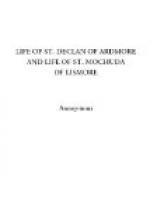The illustrious bishop, who is generally known as Mochuda, was of the Ciarraighe Luachra; to be exact—he was of the line of Fergus Mac Roigh, who held the kingship of Ulster, till the time that he gave the kingship to a woman for a year and did not get it back when the year was over. His descendants are now to be found throughout various provinces of Ireland. He fell himself, through the treachery of Oilioll, king of Connaght, and the latter’s jealousy of his wife, Meadbh, daughter of Eochaid Feidhleach. Finghen Mac Gnaoi of Ciarraighe Luachra was father of Mochuda, and his mother was Mead, daughter of Finghin, of Corca Duibhne, in the vicinity of the stream called Laune in the western part of Ireland. The forthcoming birth of Mochuda was revealed to St. Comhghall by an angel, announcing—“There will be conceived a child in the western part of Erin, and Carthach will be his baptismal name and he will be beloved of God and men—in heaven and on earth. He will come to you seeking direction as to a proposed pilgrimage to Rome—but you must not permit the journey for the Lord has assigned him to you; but let him remain with you a whole year.” All this came to pass, as foretold. In similar manner the future Mochuda was foretold to St. Brendan by an angel who declared: “There will come to you a wonder-working brother who will be the patron of you and your kindred for ever; the region of Ciarraighe will be divided between you and him, and Carthach will be his name; to multitudes his advent will be cause for joy and he will gain multitudes for heaven. His first city will be Raithen [Rahen or Rahan] in the region of Fircheall, territory of Meath and central plain of Ireland; this will become a place revered of men, and revered and famous will be his second city and church, scil.:—Lismore, which shall possess lordship and great pre-eminence.”
One day when there was a large meeting of people at a certain place in Kerry, the men and women who were present saw descending a fiery globe, which rested on the head of Mochuda’s mother, at that time pregnant of the future saint. The ball of fire did no one any injury but disappeared before it did injury to anyone. All those who beheld this marvel wondered thereat and speculated what it could portend. This is what it did mean:—that the graces of the Holy Spirit had visited this woman and her holy child unborn.
Mochuda’s father was a rich and powerful chieftain owning two strong lioses—one, on the south side of Slieve Mish, and the other, in which Mochuda first saw the light, beside the River Maing [Maine]. Both places were blessed for sake of the Saint, who was conceived in one of them and born in the other; it is even said that no evil disposed or vicious person can live in either. Carthage in due course was sent to be baptised, and, on the way, the servant who bore the infant, meeting a saintly man named Aodhgan, asked him to perform the ceremony. There was




